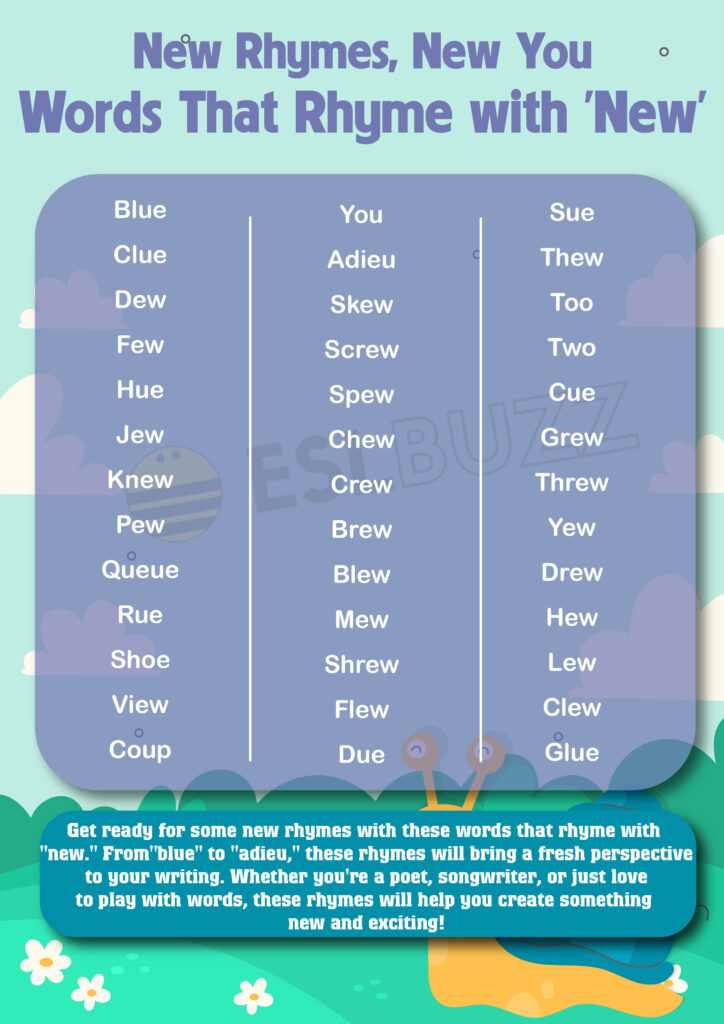The sky is a vast and beautiful canvas, inspiring poets, songwriters, and dreamers alike. Finding words that rhyme with sky can enhance your writing, whether it’s for poetry, lyrics, or creative storytelling. Understanding rhymes not only adds a musical quality to your work but also helps convey emotions and ideas more effectively. In this article, we will explore a variety of words that rhyme with sky, their meanings, and how to use them in your writing.
In addition to listing words that rhyme with sky, we will delve into techniques for using rhymes effectively in your writing. We’ll cover types of rhymes, examples in literature, and tips for improving your lyrical skills. Whether you’re a seasoned poet or a novice looking to improve your craft, this guide will provide valuable insights and resources.
By the end of this article, you’ll not only have a rich vocabulary of rhyming words at your disposal but also the skills to incorporate them into your creative projects. Let’s take flight into the world of rhymes!
Table of Contents
- Definition of Rhymes
- Words That Rhyme with Sky
- Types of Rhymes
- Using Rhymes in Writing
- Examples of Rhymes in Literature
- Tips for Creating Rhymes
- Resources for Poets and Songwriters
- Conclusion
Definition of Rhymes
Rhymes are words that have the same ending sounds, typically in the last syllable. They play a crucial role in poetry and music by adding rhythm and musicality to the text. Rhyme schemes can vary, but the most common forms include:
- End rhymes: where the rhyming words appear at the end of lines.
- Internal rhymes: where rhyming words appear within a single line.
- Near rhymes: where the sounds are similar but not identical.
Words That Rhyme with Sky
Here are some common words that rhyme with sky, categorized into one-syllable and multi-syllable rhymes:
One-Syllable Rhymes
- High
- Fly
- Die
- Why
- Buy
- Sigh
- Try
- Lie
Multi-Syllable Rhymes
- Identify
- Modify
- Amplify
- Qualify
- Justify
Types of Rhymes
Understanding the different types of rhymes can enhance your writing. Here are some key types:
- Perfect Rhyme: The vowel and consonant sounds match perfectly (e.g., sky and high).
- Slant Rhyme: The sounds are similar but not identical (e.g., sky and try).
- Eye Rhyme: Words that look similar but don’t sound the same (e.g., love and move).
Using Rhymes in Writing
Incorporating rhymes into your writing can create a sense of flow and enhance the mood of your piece. Here are some tips for effective usage:
- Read your work aloud to hear the rhythm and flow.
- Experiment with different rhyme schemes to find what works best.
- Utilize varying word lengths to create interest.
Examples of Rhymes in Literature
Many famous poets and songwriters have skillfully used rhymes. Here are a few notable examples:
- Robert Frost’s “Stopping by Woods on a Snowy Evening” uses end rhymes effectively to create a rhythmic flow.
- In song lyrics, artists like Taylor Swift and Ed Sheeran often employ multi-syllable rhymes to convey complex emotions.
Tips for Creating Rhymes
Here are some additional tips to help you create effective rhymes:
- Use a rhyming dictionary or online resources to explore new words.
- Practice writing short poems or lyrics using the words you’ve learned.
- Collaborate with other writers to gain new perspectives and ideas.
Resources for Poets and Songwriters
Here are some trusted resources to enhance your writing skills:
- RhymeZone - A comprehensive rhyming dictionary.
- Academy of American Poets - Offers resources for aspiring poets.
- Songwriting.net - A community for songwriters to share ideas and tips.
Conclusion
In conclusion, understanding and utilizing words that rhyme with sky can elevate your writing to new heights. By integrating different types of rhymes and practicing regularly, you can enhance your lyrical skills and express your creativity more effectively. We encourage you to explore the words and strategies discussed in this article and start creating your own poetic masterpieces.
Feel free to leave a comment below to share your favorite rhymes or any tips you have for writing. Don’t forget to share this article with fellow writers or friends who might find it helpful!
Thank you for reading, and we look forward to seeing you back on our site for more insightful articles on writing and creative expression!
You Might Also Like
C Standard Guitar Tuning: Everything You Need To KnowWhat Does Freon Smell Like? Understanding The Characteristics And Risks
Nyu Stern: A Comprehensive Guide To One Of The Leading Business Schools
How To Replace The Needle On A Record Player: A Comprehensive Guide
When To Go To Hospital For Fever: A Comprehensive Guide
Article Recommendations
- Brand Building_0.xml
- Mary Anne Macleod Trump
- Piper Parabo
- Water Softener Overflowing Brine Tank
- Mia Hamm Soccer Player
- Hig Roberts
- Nina Aoulik
- Global Impact_0.xml
- Financial Empowerment_0.xml
- Lax Plane Spotting Locations


